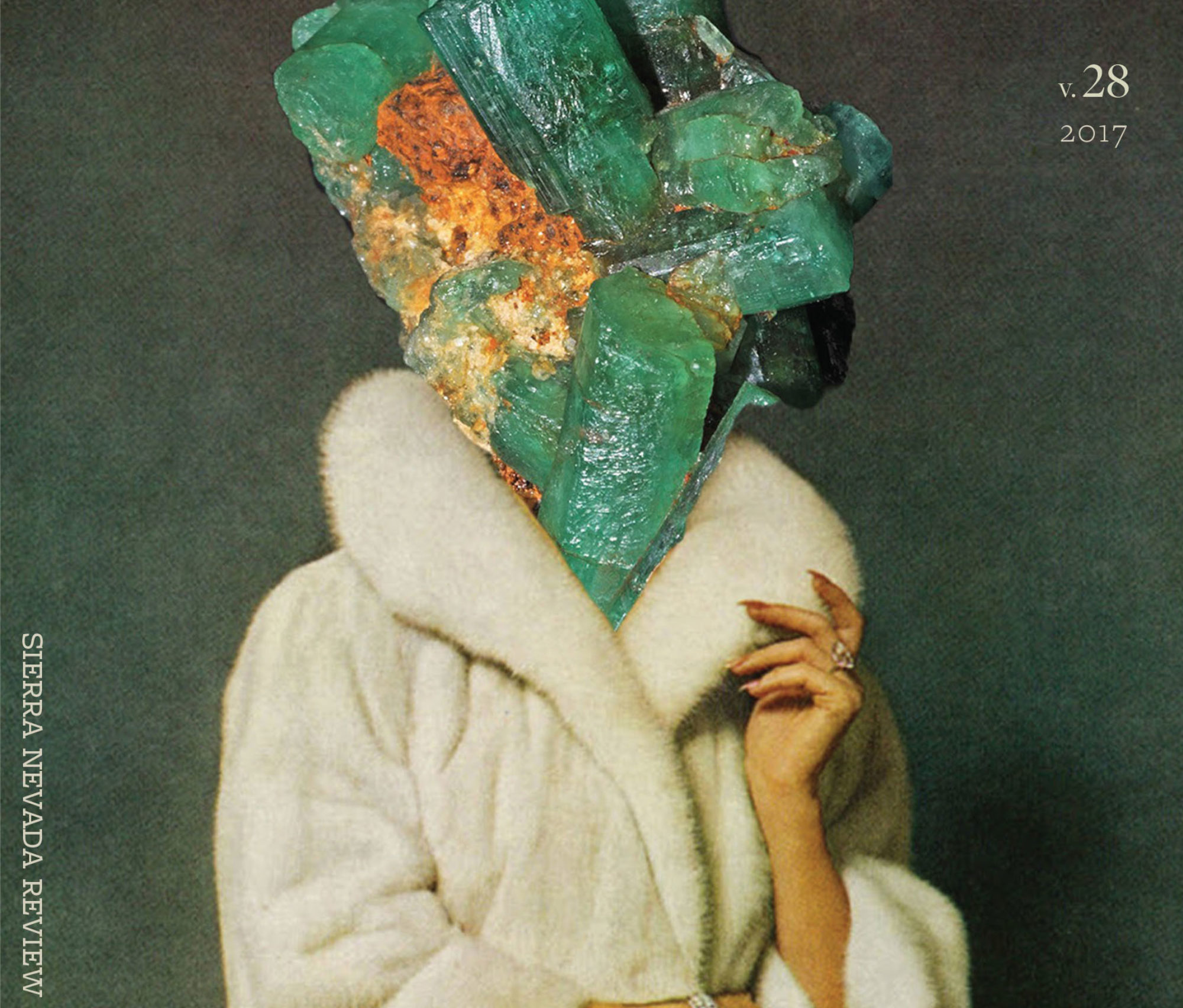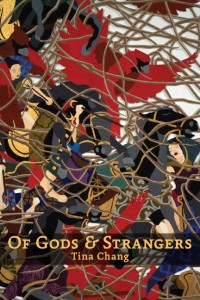by Laurie Macfee
2011
Poetry
$15.95; 103 pgs.
NY: Four Way Books
ISBN 978-1-935536-17-8
When I began Tina Chang’s entrancing Of Gods & Strangers, Monty Python could be heard in the back of my mind saying, “And now, for something completely different.” From the form of poems on the pages, to titles like the indescribably wonderful “Bitch Tree”, “Self-Portrait as Empress Dowager” or “Flesh Elegy”, to the content, which sweeps from personal to historical to political, I knew this was going to be a completely different ride.
I read with a quickening, as if I couldn’t turn pages fast enough, even while wanting to slow down and savor lines. My heart beat faster, the way it does with a novel I can’t put down: it is 3am and the arc of someone’s voice won’t release me. This is an important and heart-breaking work by the Poet Laureate of Brooklyn. How can a book be set down, upon reading lines like these, found in “Substantial”:
If I try to tell the truth, parachutes the size of fists
rain down in a territory in which they are not welcome.
If I live out my lies, I see a woman’s sketched face
on the charcoal surface of a field where she
breaks apart on the pond’s puzzle. I get on all fours,
low to the ground as if in an emergency.
I hide under desks, cover my ears, put on
a gas mask to look like a skeleton of an extinct insect.
Perhaps that was my ancestor’s story and not mine
when the blast of sirens rang through the city….
The way Chang layers images (fists, skeleton) with locations (territory, under desks), emotions (not welcome) with imperatives (an emergency), sounds of words (extinct insect) with sounds in the narrative (blast of sirens), then lands softly on a political/historic/familial truth (ancestor’s story not mine) that leads us to a simple statement hidden a couple lines later, “Who is listening / if not me?” All this makes her work immediately compelling, haunting, masterful.
Structurally, Chang’s poems are a study in form. How the lines sit on the page inform the reading of each. She uses numbers to create lists, prose-like poems (though there appear to be purposeful breaks), traditional structures like couplets or tercets, long sweeping as well as short chopped lines, solid masses of text, a poem that is 3/4s italics, double spaces between lines, stars to separate stanzas, words instead of numbers in a series (one, two, trois, four), or words that wander a page. The result is a push-pull, and we are falling, then wrapped, bound in the expected and repeated embrace of a couplet then buffeted into intellectualism found in contemporary indexing. But woven through this diversity of appearances is a personal thread of identity, so that it does not feel like she is trying on dresses so much as showing us the complexity of her owned wardrobe.
Chang writes fearlessly from a woman’s standpoint, whether talking about break-ups or “Sex Gospels”, genocide or natural disasters. Some of her experiences echo my own, such as “The Story of Girls” but most do not, like the series of ten poems sprinkled throughout the book about the last Chinese Empress Dowager. However I am grounded in her lyric and social consciousness, the way she trusts the reader to make links between ideas without spelling it out: “I dream I am whipping a donkey / and I don’t want to be whipping a donkey…./ Love is breaking me.” She strips away all pretense, is unblinking and raw. In “Possibility”, Chang writes that when she was a girl, her mother’s lover bought her a small cross and sat her on his lap, how she thought “he could be my lover too”, the fierce and almost brutal reality she ends with, “The man sat still, letting the young girl / kiss him, then never came back. / This is how dark it can get, the heart says. / And the heart fasts for years until / it is lean.”
Chang’s images can jar, like “The butchers with their smeared aprons croon with knives” in her poem “Baguio”. They can seduce with epic or horrible beauty, like the opening “All night long there was digging, and the bodies like accordions / bent into their own dying instruments, and even after this, / after the quake, there was, in news reports, still singing” from the poem “Praise”. They can touch on the philosophical or self aware, “What is it that I want / in all these disappearing cities?” or the humorous, “I was sitting on the bitch tree, smirky and small.” But the great joy in reading Chang’s Of Gods & Strangers is her endings. Her poems are waves that carry you to the place you didn’t know you needed to go, and crash you.
I read the poem “Foraging and Dodging” maybe seven times. It begins with a stranger, which links to the title of the book, and explores the way love can wound, “Think of the horseshoe, the imprint / it made when thrown against / the door. Think of the woman / who dodges it and keeps loving / the man who threw it.” There is such ferocious revelation and hope in how Chang navigates the strangers who rule our lives as gods. The last stanza ends, “as she drove away, the bend / in the road coming into her / field of vision, as if life / loved her back, as if / she had a chance.”
Buy this book today. Ask me if you can borrow my copy. Check it out of the SNC Poetry Center. Whatever you do, this is a book to be read.
__________________
 Laurie Macfee is in the MFA Writing/Poetry program at Sierra Nevada College. Currently, she is the Redfield Fellow in Book Arts at the Black Rock Press, Poetry Editor of the Sierra Nevada Review, and an adjunct in the art department at the University of Nevada, Reno. She lives with her husband artist Joseph DeLappe and their cats Pixel and Izzie in Reno.
Laurie Macfee is in the MFA Writing/Poetry program at Sierra Nevada College. Currently, she is the Redfield Fellow in Book Arts at the Black Rock Press, Poetry Editor of the Sierra Nevada Review, and an adjunct in the art department at the University of Nevada, Reno. She lives with her husband artist Joseph DeLappe and their cats Pixel and Izzie in Reno.

